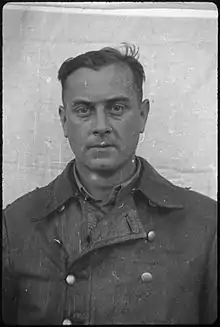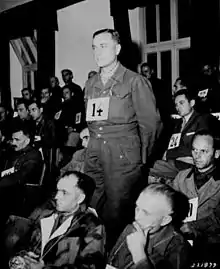Hans Eisele (physician)
Hans Kurt Eisele (13 March 1913 in Donaueschingen – 3 May 1967 in Cairo) was a German SS-Hauptsturmführer and concentration camp doctor.[1]

Personal life
The son of a church painter, Eisele came from a modest background. The situation of the family worsened significantly due to inflation of currency during the twenties. After attending the grammar school in Donaueschingen, he studied medicine in Freiburg in 1931. In 1933 he joined both the National Socialist German Worker's Party (member number 3,125,695) and the SS (member number 237,421). He was married and had three children.
Crimes in the concentration camps
In January 1940, Eisele joined the Waffen-SS, transferring to Mauthausen concentration camp, and from February to August 1941 in Buchenwald concentration camp. He served as a camp doctor, and murdered 300 prisoners suffering from tuberculosis. He also performed experimental surgery, sometimes without anaesthesia and/or with fatal outcome; in addition, he abused and tortured patients. After transferring to Natzweiler concentration camp, he joined the SS hospital in Prague in June 1942. He subsequently transferred to the SS Division Das Reich on the Eastern Front for military duty. In February 1945 he was sent to Dachau concentration camp, where he served under the First Camp Physician Fritz Hintermayer. He was arrested by U.S. forces in April 1945.
Trials and punishment

On 13 December 1945, Eisele was tried in the Dachau main trial for his participation in three executions for which he had issued the death certificates. He was sentenced to death. After commutation of the sentence to a life sentence on 11 April 1947, he was in the Buchenwald main trial, tried again and received together with twenty co-defendants the death penalty. However, the basic conviction against Eisele proved dubious and uncertain, so that four of the eight military judges submitted an application that the judgment be converted by the reviewing body to a ten-year sentence, which was granted.[2]
During his detention in prison for war criminals Landsberg, he wrote an extensive defense titled Audiatur et altera pars in which he denied the allegations and represented himself as a convinced Christian, who had always been a physician only for the sake of others. In contrast, numerous witnesses of his crimes were former concentration camp prisoners, and sometimes even former SS members. But after another penalty reduction, Eisele, on 26 February 1952, was released from prison.
Postwar career and escape to Egypt
After his release, he opened a medical practice in Munich. In 1958, during the course of the trial of Martin Sommer, a guard at Buchenwald, new allegations were made against Eisele. He fled to Egypt, where he settled under the pseudonym Carl Debouche in upmarket Cairo suburb Maadi.[3]
Eisele moved in the circles of former Nazi scientists in Egypt, after a German extradition request had been rejected.
Eisele died on 3 May 1967 and was buried in the small German cemetery in grave No. 99.[3]
Bibliography
- Ernst Klee: Das Personenlexikon zum Dritten Reich: Wer war was vor und nach 1945. Fischer, Frankfurt am Main 2007, ISBN 978-3-596-16048-8.
- Ernst Klee: Auschwitz, die NS-Medizin und ihre Opfer. 3rd edition. Fischer, Frankfurt am Main 1997, ISBN 3-596-14906-1.
- Holger Lessing: Der erste Dachauer Prozess (1945/46). Nomos, Baden-Baden 1993, ISBN 3-7890-2933-5.
- Case No. 000-50-2 (US vs. Martin Gottfried Weiss et al) Tried December 13, 1945
- Eichmüller, Andreas (2012). Keine Generalamnestie: die strafrechtliche Verfolgung von NS-Verbrechen in der frühen Bundesrepublik. Oldenbourg Verlag. p. 182. ISBN 978-3-486-70412-9.
- Harold Marcuse: Legacies of Dachau: The Uses and Abuses of a Concentration Camp, 1933-2001
- Buchenwald Concentration Camp, 1937-1945: A Guide to the Permanent Historical Exhibition: Wallstein Verlag, 2004.
- Devin O. Pendas: "The Frankfurt Auschwitz Trial, 1963-1965: Genocide, History, and the Limits of the Law" Cambridge University Press, Nov 7, 2005.
References
- "Hans Eisele (physician)". memim.com. Retrieved 20 April 2016.
- "Archived copy". Archived from the original on 2014-12-18. Retrieved 2013-02-09.CS1 maint: archived copy as title (link)
- Fisk, Robert (August 7, 2010). "Butcher of Buchenwald in an Egyptian paradise". The Independent.